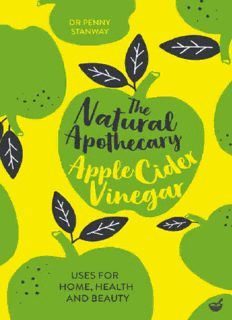
The Natural Apothecary: Apple Cider Vinegar: Tips for Home, Health and Beauty PDF
Preview The Natural Apothecary: Apple Cider Vinegar: Tips for Home, Health and Beauty
Other titles in the Natural Apothecary series include: The Natural Apothecary: Baking Soda The Natural Apothecary: Lemons About the author: Dr Penny Stanway practised for several years as a GP and child-health doctor before becoming increasingly fascinated by researching and writing about healthy diets and other natural approaches to health and wellbeing. Penny has written more than 20 books on health, food and the connections between the two. She lives with her husband on a houseboat in the Thames. CONTENTS Introduction Chapter 1 About Cider Vinegar Chapter 2 Cider Vinegar and a Healthy Diet Chapter 3 Natural Remedies for Health Chapter 4 Natural Remedies for Health Chapter 5 Natural Cleaning Products INTRODUCTION For many thousands of years, people have been using natural products to soothe, treat, beautify and cleanse. Herbs and spices, vegetables, fruits, nuts and berries (as well as secondary products such as olive oil and vinegar) have been mixed together to create traditional remedies that have been passed down through the generations. Many of these ingredients are still used in commercial products today, although are now often combined with harsh chemicals. Today, we are used to relying on pharmacies and supermarkets, where there are hundreds of available products, each with a different purpose. We apply creams and ointments for various aches and pains, take vitamin supplements, and spend a fortune on lotions and potions for our skin, nails and hair. The number of cleaning products that are now on offer can be quite overwhelming! By going back to basics, and taking a more natural approach to how we treat our diets, health, beauty regimes and household management, we are taking back control of what we are putting into our bodies and what we are exposing our families to. Apples, apple juice, cider and cider vinegar have a long history and are much loved around the world, able to promote and protect our health and wellbeing. What’s more, cider vinegar is a cheap and efficient source of help in the home. Apples are the most popular fruit in the world, and as the saying goes, ‘an apple a day keeps the doctor away’. Archaeologists believe that apple trees originated around the Caspian Sea and the Black Sea, and that people ate apples as far back as 6500 bc. Apple cultivation spread to Europe and in the 16th century King Henry VIII instructed his fruiterer to search the world for the best varieties, so he could set up orchards in England. Apple cultivation spread to the US, Australia, New Zealand, South Africa and South America. Nowadays, more than 7,500 varieties of apple are grown worldwide, and in many countries either home-grown or imported apples are available year-round. Historians are unsure when people first enjoyed cider, but they know it was a common drink in Britain in the first century bc and think it was probably available around the Mediterranean in the 1st century ad. In contrast, archaeologists say that cider vinegar has been used for much longer, since traces of it exist in Egyptian urns dating from 3000 BC. The word ‘vinegar’ comes from the Old French ‘vyn egre’, which in turn came from the Latin ‘vinum’ + ‘acer’ (‘wine’ + ‘sour’). A mild acid, that is relatively easy to produce, vinegar has a long history of use in industrial and medical spheres as well as in the home. Vinegar is a liquid primarily made up of acetic acid and water. It acts as corrosive agent and a preservative as well as being useful as a cleaning fluid. It is inexpensive and readily available, and homemade versions can be made relatively simply. Vinegar is most often made from fruit or grains, or from alcoholic drinks, such as cider. Other types of vinegar include: – fruit vinegars – balsamic vinegar – cane vinegar – grain vinegar, such as rice vinegar or malt vinegar – spirit vinegars, such as wine vinegars or sherry vinegar Vinegar has traditionally been thought to offer many health benefits, and a surprising number of common ailments can be treated using cider vinegar, see pages 34–81. Vinegar has antibacterial properties and can be used to cleanse and deodorize your body. Cider vinegar is a mild enough acid that is a helpful aid in maintaining the skin’s natural acidity (see page 85). Cider vinegar is also useful for many household chores and can help keep your home fresh, clean and sparkling. It also makes a great pest-controller! For environmentally-friendly, non-toxic ideas for using cider vinegar as a natural cleaning product, see pages 100–115. NOTE • What the English call ‘apple juice’ is known as ‘cider’ or ‘sweet cider’ in some countries, including the US. • What the English call ‘cider’ is called ‘hard cider’ in some countries, including the US.
Description: